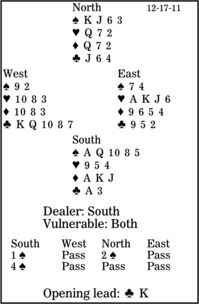Bridge column, December 17: Sending preference when following suit

If you and your partner can use the suit-preference signals we will look at today, you will be held in high esteem by your peers.
How should the declarer-play and defense go in this four-spade contract after West leads the club king?
South's jump to game is normal, but with such a balanced hand, he should not be surprised if the contract isn't ironclad.
Declarer starts with four losers: three hearts and one club. West cannot have the ace and king of hearts, because he would have led that suit, not a club. Consequently, South has only nine winners: five spades, three diamonds and one club. However, if declarer wins the first trick and immediately returns a club, he will establish dummy's jack as a winner. Then, if West does not shift to a heart, the contract will make.
Note that West seems to have a guess between hearts and diamonds. However, East can tell his partner which suit to lead. At trick one, East must discourage with the club two. But on the second round, he can play his nine or five with impunity. Here, because he would like a heart switch, he drops the nine, the higher card asking for the higher-ranking side suit.
There is one last similar point. If declarer draws trumps immediately, East should play first his seven, then the four, as a signal for hearts.
** ** **
COPYRIGHT 2011, UNITED FEATURE SYNDICATE
DISTRIBUTED BY UNIVERSAL UCLICK FOR UFS

